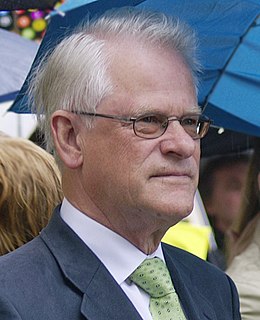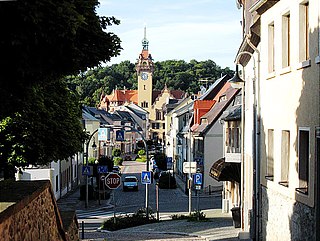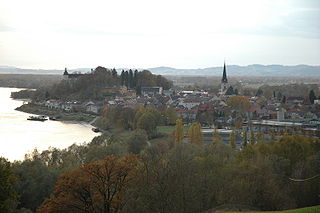
Grästorp Municipality is a municipality in Västra Götaland County in western Sweden. Its seat is located in the town of Grästorp.

Wenden is a community in North Rhine-Westphalia, Germany. It belongs to the Olpe district in the Sauerland. It lies 10 km south of Olpe and approx. 20 km northwest of Siegen.

Oberpullendorf is a town in Burgenland, Austria. It is the administrative center of the district of Oberpullendorf.

The Social Democratic Party is an extra-parliamentary political party in Moldova, currently led by Victor Șelin.
The municipalities of Greece are the lowest level of government within the organizational structure of that country. Since the 2011 Kallikratis reform, there are 325 municipalities. Thirteen regions form the largest unit of government beneath the State. Within these regions are 74 second-level areas called regional units. Regional units are then divided into municipalities. The new municipalities can be subdivided into municipal units, which are subdivided into municipal communities or local communities.

General elections were held in Sweden on 15 September 1991. The Swedish Social Democratic Party remained the largest party in the Riksdag, winning 138 of the 349 seats.

The Portuguese local election of 2005 took place on 9 October. The election consisted of three separate elections in the 308 Portuguese municipalities, the election for the Municipal Chambers, whose winner is elected mayor, another election for the Municipal Assembly and a last one for the lower-level Parish Assembly, whose winner is elected parish president. This last was held separately in the more than 4,000 parishes around the country.

The Portuguese local elections of 1979 took place on 16 December. They were the second local elections in Portugal since the democratic revolution of 1974 introduced the concept of democratic local power.

The Portuguese local elections of 1976 took place on 12 December. They were the first local elections in Portugal. The democratic revolution of 1974 introduced the concept of democratic local power, that should be exerted by the citizens in their towns and cities.

The Portuguese local elections of 1982 took place on 12 December. They were the third local elections in Portugal since the democratic revolution of 1974 introduced the concept of democratic local power.

Municipal elections were held in South Africa on 1 March 2006, to elect members to the local governing councils in the municipalities of South Africa. The municipalities form the local government of South Africa and are subdivisions of the provinces, thus making them responsible for local service delivery, such as electricity, water and fire services.
An exclusive mandate is a government's assertion of its legitimate authority over a certain territory, part of which another government controls with stable, de facto sovereignty. It is also known as a claim to sole representation or an exclusive authority claim. The concept was particularly important during the Cold War period when a number of states were divided on ideological grounds.

The Portuguese local elections of 1985 took place on 15 December. They were the fourth local elections in Portugal since the democratic revolution of 1974 introduced the concept of democratic local power.

Waldheim is a town in Mittelsachsen district, in Saxony, Germany.

Meine is a municipality in the district of Gifhorn, in Lower Saxony, Germany. It is a village and member municipality of the Samtgemeinde Papenteich. The Municipality Meine includes the villages of Abbesbüttel, Bechtsbüttel, Grassel, Gravenhorst, Meine, Meinholz, Martinsbüttel, Ohnhorst, Wedelheine, Wedesbüttel.

Rötgesbüttel is a municipality in the district of Gifhorn, in Lower Saxony, Germany. It is a member municipality of the Samtgemeinde Papenteich

Ottensheim is a municipality in the district of Urfahr-Umgebung in the Austrian state of Upper Austria. In July 2008 it hosted the World Rowing Championships, and it will do so again in 2019.
The Imperative mandate is a political system in which "representatives enact policies in accordance with mandates and can be recalled by people’s assemblies". It requires a context in which "power is not monopolized by the state, but distributed in a plurality of municipalities and assemblies with specific political authority".

The Party for Justice, Integration and Unity is a nationalist political party in Albania whose primary aim is the promotion of national issues. The party's goals and objectives are to express the struggle of the "Ethnic Albanians", who after world and regional wars, are facing challenges that affect their rights. In the light of paradigms such as freedom and human rights, these challenges bring them together, forge common interests, and constitute their national issues." The party focuses on highlighting national issues, including Kosovo, Albanians in Macedonia, Montenegro, Presevo Valley and especially the Cham issue.

The Portuguese local elections of 2013 took place on 29 September. The elections consisted of three separate elections in the 308 Portuguese municipalities, the election for the Municipal Chambers, whose winner is elected mayor, another election for the Municipal Assembly, as well an election for the lower-level Parish Assembly, whose winner is elected parish president. This last will be held separately in the more than 3,000 parishes around the country. There was a reduction in the number of Parishes of more than 1000 parishes and, consequently, Parishes Assemblies and their respective leadership positions due to a local government reform undertaken by the Government led by Pedro Passos Coelho.





























